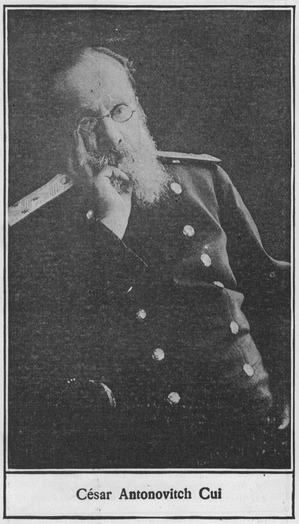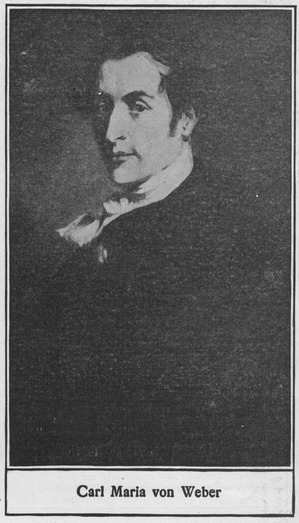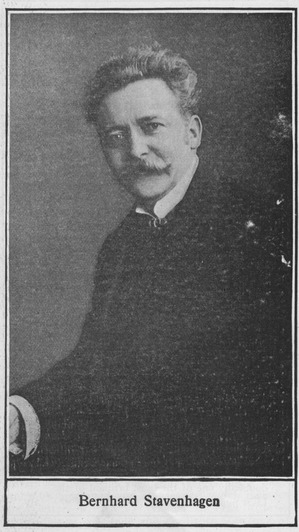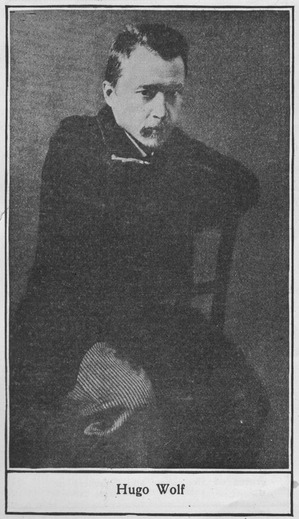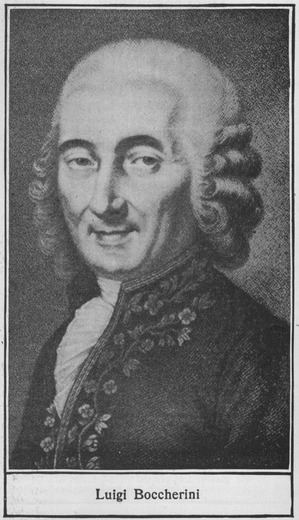(Quee.)
Cui was born at Vilna, Poland, January 18, 1835. His father was a French officer, left behind in the retreat from Moscow, in 1812, afterwards becoming professor of French at the High School, Vilna. He early showed a precocious talent for music, and studied the piano, and during holiday times he studied theory of music with Moniuszko. In 1850 he went to the School of Military Engineering in St. Petersburg, from which he graduated in 1857. At the same time he came under the influence of Balakirev, one of the pioneers of the “New School” of Russian music. This revived Cui’s keen interest in music, and he continued to work at composition during his spare time, and enjoyed the friendship of such men as Rimsky-Korsakoff and Moussorgski. Eventually he became an acknowledged authority on fortifications, and rose to the rank of Lieutenant-General, and at one time the present Emperor of Russia was one of his military pupils. As a musician, Cui is best known by his compositions, and may be regarded as self-taught. He has composed eight operas, many choral and orchestral works and works for strings, besides a large number of pianoforte pieces and songs. His best-known piano pieces are, perhaps, the Berceuse and the Cansonetta. Since 1864 he has added to his laurels by his brilliant contributions to musical literature.
(Vay’-ber.)
Weber was born at Eutin, Holstein, Germany, and died in London, June 5, 1826. He was the son of an army officer who eventually became a professional viola player. After some years of a wandering life he was taught music by Michael Haydn, the brother of Franz Josef, in Salzburg, where Weber was a chorister at the cathedral. While in Munich from 1798 to 1800, he studied under Valesi and Kalcher, and appeared as a concert pianist. Freiburg was his next abiding place, and his first opera, Das Waldmädchen, was produced there. He returned to Salzburg for further study with M. Haydn. In 1803, Weber settled in Vienna, where he was a pupil of Abt Vogler, the teacher of Meyerbeer. A year later Weber was Capellmeister at Breslau city theater. In 1806, he went on tour, going to Prague, in 1813, as Capellmeister of the National theater. He was appointed conductor at the Royal opera, in Dresden, in 1817, and retained this position until his death. His chief compositions are Der Freischüts (1821), Euryanthe (1823), and Oberon (1826). His other compositions include two symphonies, the Jubilee overture, concertos, chamber-music, the famous Concertstück for piano and orchestra, besides other works of a similar nature. His early life was wild and reckless, but he afterward became a model husband and father. Weber is regarded as the founder of the German “Romantic” school of music. He was unquestionably an originator as well as a composer.
(Stah-ven-hah’-gen.)
Stavenhagen was born in Greiz (Reuss), Germany, November 24, 1862. He was a pupil of Kiel at the Meisterschule, and of Rudorff at the Hochschule, Berlin, where he won the Mendelssohn prize for pianoforte playing in 1880. He remained in Berlin for five years, but eventually went to Weimar, where he became a favorite pupil of Franz Liszt. He remained with Liszt, accompanying him on all his tours, until Liszt died in Weimar. In 1890, Stavenhagen became Court pianist to the Grand Duke at Weimar, and in 1895 he became Capellmeister. Stavenhagen left Weimar in 1898 to go to Munich, as Capellmeister, and was eventually elected director of the Royal Academy (1901) in that city. In 1904, however, he retired and returned to Weimar, where he still lives as teacher, pianist and conductor. He has made several brilliantly successful piano tours through Germany, Austria, Hungary, France, Holland, England, and the United States (1894-5). Stavenhagen has composed a few piano pieces, of which the best known are the Caprice and the Menuetto Scherzando. He is an intellectual pianist of a very high order, and is undoubtedly one of the most brilliant of the Liszt pupils now living.
(Vohlf.)
Wolf was born at Windischgraz, Austria, March 13, 1860, and died February 22, 1903. His father was opposed to young Wolf adopting a musical career, but eventually allowed his son to study at the Vienna Conservatory, in 1875. He got into difficulties with the authorities, as his musical opinions made him disobey all the contrapuntal rules, and his temperament made him indifferent to most other rules. For a while he lived in great poverty in Vienna, and was on the point of emigrating to America, but was offered the post of second Capellmeister, at Salzburg. Before two months, however, he was back in Vienna. From 1884 to 1888 he was musical critic for the “Wiener Sonenblatt.” Gradually he became known, first among musicians, and later to the public, as a writer of songs. He was an ardent admirer of Wagner, and was greatly influenced by that composer. His instrumental works consist of a symphonic poem, Penthesilea, an Italienesche Serenade for strings, and a few other works of a similar nature. As a song-writer he ranks with the very highest, but never lived to attain the position which is now accorded to him. He possessed a furious mental energy, which manifested itself at intervals throughout his life, and eventually broke bounds. He became a raving lunatic, and died in an asylum. He was buried near the graves of Beethoven and Schubert in Vienna.
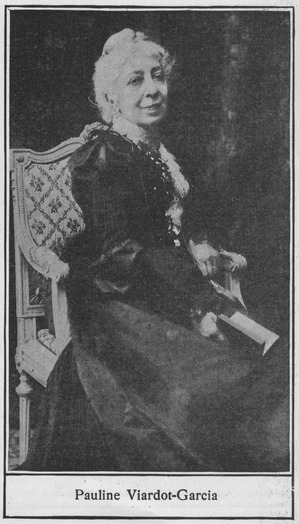 MICHELLE FERDINAND PAULINE VIARDOT-GARCIA.
MICHELLE FERDINAND PAULINE VIARDOT-GARCIA.
(Ve-ar-doh Gar-thea.)
Viardot-Garcia was born in Paris, July 18, 1821, and died there May 18, 1910. She was the daughter of Manuel Garcia, the elder, and, of course, sister to Malibran, and to Manuel Garcia, the inventor of the laryngoscope. She declared that her only singing teacher was her mother, but she acted as her father’s accompanist until his death, and in spite of her youth learned much from him. She was with him in his American travels, when he was made to sing by brigands, in Mexico. She studied piano with Meysenberg and Liszt, and was also an accomplished painter. Her operatic career commenced in 1837, when she made her début in Brussels. A brilliant success in Paris followed, and she soon established herself as a favorite, and appeared in the operas of Rossini, Meyerbeer and, later, Gounod. In 1840, she married Viardot, the impresario, and critic. She was greatly admired by Liszt, and Chopin, and indeed, by all who realized her remarkable histrionic powers, and her consummate mastery of the singer’s art. Her Paris success was equalled wherever she appeared in Europe, and she bears one of the most honored names in music. In 1863, she retired from the operatic stage, and went to live in Baden, but as the wife of a Frenchman was obliged to leave Germany in 1871, and went to Paris, where she became professor of singing at the Conservatoire. She also composed many operettas.
(Bok-er-ee’-nee.)
Boccherini was born at Lucca, February 19, 1743, and died May 28, 1805. He was first taught by his father, an able bass player, and the Abbé Vannucci. In 1757 the boy was sent to Rome, where he rapidly became famous as a composer and player. He returned to Lucca, where works of his were produced. Later, he went on tour, and eventually arrived in Paris, where he became very popular. He was persuaded to visit Spain, but the reception that Boccherini and his party received in Madrid was disappointing. They managed to gain some support, however, and remained there for some time, but later, probably between 1782 and 1787, Boccherini went to Germany. A composition dedicated to the King of Prussia, Friedrich Wilhelm II, procured him a valuable post, which he retained until the death of the monarch left him again friendless. He returned to Spain, where he regained some of his old-time favor. He was the victim of many misfortunes, however, and eventually died in great poverty. Much of his music became very popular, and is even heard today, though it is somewhat characterless. His powers as a composer were aptly summed up by Puppo, the violinist, who said that “Boccherini is the wife of Haydn.” Boccherini was extremely prolific, and his instrumental works amount to 467 pieces, and consist of all kinds of Works.


